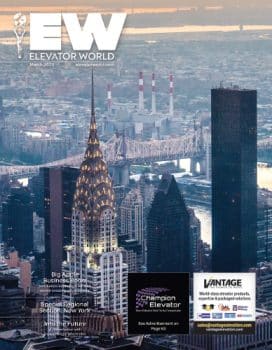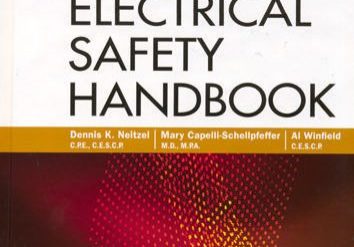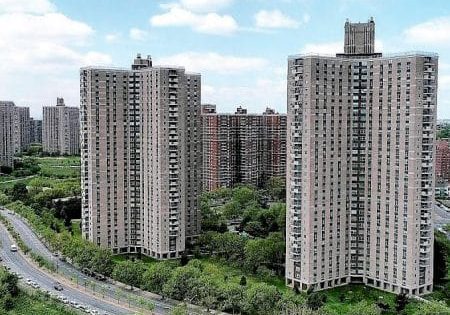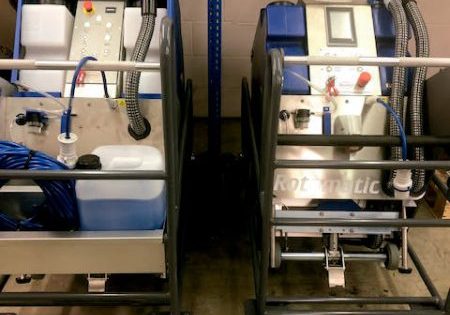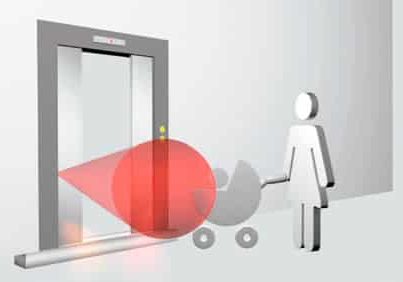A Long Time Coming
Mar 1, 2020
The Elevator Safety Act will mean changes for the industry but, ideally, yield a safer elevator world.
By Kaija Wilkinson
After eight years of negotiation and a mind-boggling number of iterations (five from December 2019-January 2020, for example), New York Gov. Andrew Cuomo approved the Elevator Safety Act (New York State Assembly Bill S7306) on January 2, with the final version published on January 17. The State of New York and NYC, arguably the elevator capital of the world, now join about 30 other states with similar laws. “This should be the final language,” says Bobby Schaeffer, president of D&D Elevator, headquartered in Elmsford, New York. Set to go into effect approximately two years from the date of its adoption, the law will require elevator mechanics to possess a Certified Elevator Technician (CET®) certification issued by the National Association of Elevator Contractors (NAEC) or an equivalent recognized by the NYC Commissioner of the Department of Buildings or the New York State Department of Labor (DoL). An example of an equivalent is the National Elevator Industry Educational Program offered through the International Union of Elevator Constructors (IUEC) for apprenticeship or the Joint Apprenticeship Training Committee program offered through International Brotherhood of Electrical Workers Local 3.
Accessibility technicians will have to possess a Certified Accessibility and Private-Residence Lift Technician (CAT®) license from NAEC or an equivalent recognized by the commissioner. Also accepted is NAESA International’s Qualified Elevator Inspector (QEI) training. NAEC’s QEI certification program has not yet been accepted because it is not yet accredited, but proponents of training, like Schaeffer, are confident it will be added once that happens.
The Elevator Safety Act will also establish the New York State Elevator Safety and Advisory Board. In previous versions of the bill, this board would have consisted of nine individuals; the final version calls for 13: seven appointed by the governor, three by the speaker of the New York State Assembly and three by the Senate.
Schaeffer anticipates the board being named late this year or in early 2021. Whoever is on it will have to “know this legislation back and forth, up and down,” he says, as they will be charged with creating future licensing requirements and a licensing exam mechanics may be required to take to qualify for renewal after their first two licensed years. The board will also determine local requirements and industry standards regarding elevator inspections. Their goal will be to ensure elevators are being inspected by licensed inspectors at both the city and state levels. Appointees will be representatives of elevator manufacturers, building owners or managers, elevator industry construction workers, elevator servicing companies and industry associations. A fire department representative could also be appointed.
While it may have added urgency for the governor to finalize and sign the bill, the [deadly elevator] incident [in Kips Bay in 2019] was not the well from which the law sprung.
Associations could include entities like NAEC, NAESA International and the Elevator Conference of New York. Manufacturers could be representatives from National Elevator Industry, Inc. member companies or area independents. “Certainly, somebody from GAL (a member of the Vantage family of companies) could be appointed to the board, since they’re one of the largest manufacturers of elevator equipment in the state of New York,” Schaeffer says. “We would also point out they are one of the largest, if not the largest, employer in the Bronx.”
To be sure, Schaeffer has skin in the game, as D&D opened its Elevator Learning Center (ELC) in October 2018 (ELEVATOR WORLD, February 2019). ELC offers CET, which was started in 2001 with support from EW Editor-at-Large Ricia Sturgeon- Hendrick, Schaffer and NAEC. It achieved accreditation in 2011. In January, Schaeffer said the ELC was chugging along, with two candidates on the cusp of becoming CETs and four CET graduates since 2018.
Schaeffer describes passage of the bill as “fantastic.” And, with language incorporated that allows other programs, no one feels left out, he says. Mike Halpin, a spokesperson for IUEC Local 1 called it “a huge win for elevator workers and the elevator-riding public.”[1]
The tragic death of a young man in a Kips Bay, Manhattan, elevator accident in August 2019 brought increased attention to the need for greater oversight of industry training and safety. While it may have added urgency for the governor to finalize and sign the bill, the incident was not the well from which the law sprung. IUEC Local 1 has, for nearly a decade, “sought licensing rules to toughen elevator safety in NYC by setting minimum education and training standards for elevator mechanics.”[2]
There are a lot of components that still have to come together before the law goes into effect. Schaeffer says:
“After the board is named, in 2021 is when those appointed will work with the commissioner of the Department of Buildings (DoB) and the commissioner of the New York DoL to put the requirements together. [The Elevator Safety Act] is supposed to take effect two years after it’s been adopted, but it has a caveat — as long as it’s funded. So, number one, legislators have got to get the money to fund it, because they’ve got to pay for the time and effort to create the board. They’ve got to create another licensing subdivision within the DoL and DoB. They’ve got a lot of work to do.”
The DoL commissioner will set the application fees for elevator mechanics’ licenses. As of this writing, fees had not yet been set, but Schaeffer says one would imagine they would be in line with New Jersey’s, which is US$100 initially, then US$260 for a renewal after two years. New Jersey also requires an insurance bond for each mechanic, while New York requires insurance for companies but not mechanics.
Some companies will offer their mechanics’ assistance with licensing fees, and this cost will affect companies’ costs of doing business. Even so, many companies are on board with the legislation. National Elevator Cab and Door CEO Jeff Friedman says elevator safety is the highest priority for elevator contractors and building owners. If increased spending on mechanic licensing reduces the available budget for cabs, Friedman says his company will emphasize its ability to find “the right solution for the right price.”
There will be few losers in the post-Elevator Safety Act world, Schaeffer says. “Let’s face it; it will affect companies that don’t want to educate their people.” That, however, could be a good thing as a stronger, more safety-conscious industry emerges. Schaeffer states:
“I think it’s a win for almost everybody. It’s a win for the unions, and it’s a win for the industry, because it raises the bar for all of us to be more professional and educate ourselves. Currently, that is not the case. Continuing education is always a good thing. The way it’s written right now, without seeing any other requirements from the DoL, it’s a win all the way around. It’s a win for the associations, it’s a win for the contractor companies that do training and safety. It’s a win for real estate owners and managers, because it ensures they have licensed contractors working in their buildings. And it’s absolutely a win for the riding public.”
References
[1] Jeans, David. “NY elevator mechanics may soon be forced to receive safety training and licensing,” The Real Deal, June 21, 2019.
[2] Campanile, Carl. “Elevator Safety Law Awaits Cuomo’s Signature Months After Horrific Accident,” New York Post, December 23, 2019.
Get more of Elevator World. Sign up for our free e-newsletter.

